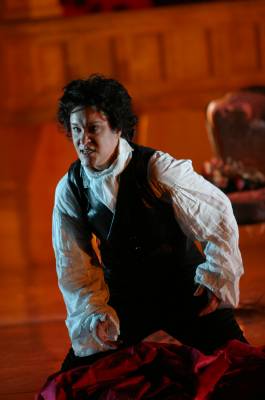|
<< -- 3 -- Robert Hugill GRIPPING STUFF

This darkness, which carries over into Act 3, is something that Alden pre-figures in the happier Act 1. Wolfgang Göbel's lighting (revived by Paul Taylor) is harsh and puts the singers in strong side light for much of the time. Neither Alice Coote nor Rebecca Evans seemed entirely relaxed in Act 1. This might be a case of first night nerves, but Coote has always been best at complex characters and in Act 1 all Ariodante has to do is be happy.
Ariodante is the first opera which Handel wrote after he lost the services of his star castrato, Senesino, to the rival Opera of the Nobility. Senesino had created a series of remarkable roles in Handel's operas and he was a superstar, so Handel needed a suitable replacement. For Ariodante he found Carestini, who had the advantage of having a very different voice to Senesino. Senesino was an alto with a range of little over an octave and who specialised in long lyrical lines and droopy, unhappy lovers. Carestini had a range of two octaves and was a soprano who specialised in fast, exciting almost instrumental vocal writing. Handel used this in writing the role and created a series of long, taxing arias for him.

Alice Coote in the title role of Handel's 'Ariodante'. Photo © 2006 English National Opera and Stephen Vaughan
|
I had last seen Alice Coote in the title role of Handel's Orlando at the Royal Opera House. The tessitura of this role, the last Handel wrote for Senesino, seemed a little low for Coote and it was with relief that I heard her as Ariodante. The tessitura suits her voice perfectly and she is entirely at home with the dramatic passage-work that is an essential part of the role. Coote successfully created an androgynous demeanour that went with the lovely dark colours of her voice. If she had seemed not quite in charge in Act 1, with the opening of Act 2 she dominated every scene she was in, starting with a hauntingly brilliant performance of 'Scherza infida'. From the opening notes of the aria's ritornello, with its lovely independent bassoon part, this was gripping stuff. Conductor Christopher Moulds and the ENO orchestra were on prime form and supported Coote wonderfully. Coote is an experienced Handelian so she worked with Handel's vocal line to create the passion that mirrored her extreme body language. Alden had helped her produce an extreme, dramatic performance but never at the expense of doing violence to the music. This was a highly adept combination of modern staging and fine musicianship. After this moment, Ariodante disappears from the opera until Act 3, an interesting example of Handel and his librettist subsuming the requirements of opera seria to the necessities of the plot; this is one of those rare things, an opera seria which is almost entirely plot driven. Coote was on brilliant form for Ariodante's final aria of triumph. A long, virtuoso piece which Coote brought off despite being weighed down by armour.
Continue >>
Copyright © 5 June 2006
Robert Hugill, London UK

|

